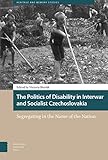The Politics of Disability in Interwar and Socialist Czechoslovakia : Segregating in the Name of the Nation / ed. by Victoria Shmidt.
Material type: TextSeries: Heritage and Memory Studies ; 7Publisher: Amsterdam : Amsterdam University Press, [2019]Copyright date: ©2019Description: 1 online resource (252 p.)Content type:
TextSeries: Heritage and Memory Studies ; 7Publisher: Amsterdam : Amsterdam University Press, [2019]Copyright date: ©2019Description: 1 online resource (252 p.)Content type: - 9789048544059
- 362.409437
- online - DeGruyter
| Item type | Current library | Call number | URL | Status | Notes | Barcode | |
|---|---|---|---|---|---|---|---|
 eBook
eBook
|
Biblioteca "Angelicum" Pont. Univ. S.Tommaso d'Aquino Nuvola online | online - DeGruyter (Browse shelf(Opens below)) | Online access | Not for loan (Accesso limitato) | Accesso per gli utenti autorizzati / Access for authorized users | (dgr)9789048544059 |
Frontmatter -- Table of Contents -- List of Figures -- Acknowledgements -- List of Archives and Used Abbreviations -- Introduction. The Politics of Disability: Structure and Agency in Nation Building in Czechoslovakia -- Part 1. Building the Czechoslovak Nation and Sacralizing Peoples' Health: The Vicissitudes of Disability Discourse during the Interwar Period -- Introduction -- 1. Establishing National Public Health in Interwar Czechoslovakia -- 2. The Discourse of Disability -- 3. Politics Concerning the Roma during the Interwar Period -- Part 2. Postwar Institutionalization of Care for the Disabled: Toward a Universalized Discourse of "Defective Gypsies" -- Introduction -- 4. Special Education in Czechoslovakia between 1939 and 1989 -- 5. The Intersectionality of Disability and Race in Public and Professional Discourses about the Roma in Socialist Czechoslovakia -- 6. The Forced Sterilization of Roma Women between the 1970s and the 1980s -- Conclusions -- Abstracts in German and French -- Bibliography -- Index
restricted access online access with authorization star
http://purl.org/coar/access_right/c_16ec
Answering the question concerning what driving forces had led public health, welfare policy and education to operate as agents and structures of segregation is one of the core prerequisites for sustainable desegregation and historical justice. This book reexamines the politics of disability in interwar and socialist Czechoslovakia as embedded into nation building, recruited to legitimize diverse forms of structural violence against people with disabilities and ethnic minorities. The authors trace the intersectionality of ethnicity and disability, which proliferated across diverse realms of public life, positioning the continuities and ruptures of interrogating propaganda and racial science during the interwar and post-war periods as establishing and reinforcing the border between a healthy Czech majority and a disabled Roma minority. Writing from their experience, the authors critically revise this border that remains observable but unapproachable until it operates as a part of constructing the authenticity of a nation.
Mode of access: Internet via World Wide Web.
In English.
Description based on online resource; title from PDF title page (publisher's Web site, viewed 02. Mrz 2022)


